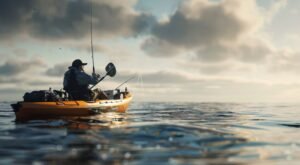
Hey there, saltwater warriors! Kayak fishing in saltwater is an exhilarating way to connect with the ocean and its myriad game fish. Whether battling waves off the coast or navigating the calm waters of a bay, mastering this sport requires skill, knowledge, and the right gear. Let’s dive into the essentials to make your saltwater kayak fishing adventure successful.
Understanding Saltwater Conditions
Freshwater vs. Saltwater Fishing
Saltwater environments present unique challenges not typically found in freshwater. Salinity, tides, and the sheer size of the water bodies significantly affect fishing tactics and the behavior of target species.
Navigating Tides and Currents
Understanding and planning around tides and currents are crucial in saltwater environments. These factors can influence where fish are likely found and how they behave, making or breaking your fishing day.
Essential Gear for Saltwater Kayak Fishing
Must-Have Equipment
Your gear list should include saltwater-specific rods, reels, and tackle designed to withstand the ocean’s corrosive nature. Always opt for quality, corrosion-resistant materials to ensure longevity and functionality.
Choosing the Right Kayak
A stable, durable sit-on-top kayak is often preferred when it comes to saltwater kayak fishing. These models offer better handling in choppy waters and are generally easier to get in and out of, an essential feature if you plan to wade or swim.
Techniques for Saltwater Fishing from a Kayak
Paddling Strategies
Effective paddling techniques are vital in managing the often unpredictable saltwater conditions. Learn how to paddle efficiently to conserve energy for fishing rather than fighting the water.
Fishing Tactics
Adapt your strategies to target specific saltwater species. Techniques like trolling, jigging, or using topwater lures can be highly effective depending on the species and current conditions.
Safety Precautions in Saltwater Kayaking
Essential Safety Gear
Only hit the water with your Personal Flotation Device (PFD), a communication device, and navigational tools. Saltwater environments can change rapidly, and being prepared is key.
Handling Emergencies
Familiarize yourself with basic first aid and emergency procedures tailored to saltwater environments. Know how to handle sudden weather changes and what to do if you capsize.
Bait and Lure Selection for Saltwater Species
Choosing Effective Baits
Selecting the right bait or lure is pivotal. For saltwater kayak fishing, live baits such as shrimp, crabs, or small fish are extremely effective, as are robust, brightly colored lures for deeper waters.
Location Scouting and Understanding Marine Habitats
Finding Fishing Spots
Use tools like fish finders or GPS devices to locate underwater structures where fish will likely congregate. Understanding the marine ecosystem’s seasonal variations can significantly enhance your success rates.
Maintenance and Care for Gear Post-Trip
Cleaning and Storage
Properly cleaning your kayak and gear after each trip is vital, especially in saltwater environments. Rinse everything with fresh water, check for damage, and store your equipment in a cool, dry place.
Conclusion
Mastering kayak fishing in saltwater is an ongoing process that blends skill, preparation, and respect for the marine environment. With each trip, you’ll learn more about the sea, the fish, and yourself as an angler.
FAQ Section
Q: What’s the best time of day for saltwater kayak fishing? A: Early morning or late afternoon are typically the best times, as many species are more active during these periods.
Q: How do I handle a large fish from a kayak? A: Use a fish grip to maintain control and a net to secure the catch. Be prepared to stabilize your kayak as large fish can unbalance it.
Q: Is it necessary to have a pedal kayak for saltwater fishing? A: While not necessary, pedal kayaks can be advantageous in salt water due to their ease of maneuvering and the ability to keep hands free for fishing.
Embark on your next saltwater kayak fishing journey with confidence, and remember, every trip is an opportunity to learn something new!